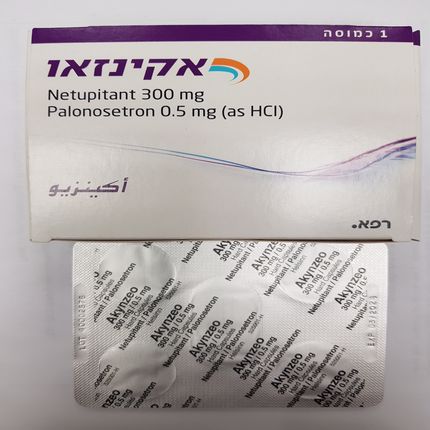Quest for the right Drug

אקינזאו 300 מ"ג/0.50 מ"ג AKYNZEO 300mg/0.50mg (NETUPITANT, PALONOSETRON AS HYDROCHLORIDE)
תרופה במרשם
תרופה בסל
נרקוטיקה
ציטוטוקסיקה
צורת מתן:
פומי : PER OS
צורת מינון:
קפסולות : CAPSULES
עלון לרופא
מינוניםPosology התוויות
Indications תופעות לוואי
Adverse reactions התוויות נגד
Contraindications אינטראקציות
Interactions מינון יתר
Overdose הריון/הנקה
Pregnancy & Lactation אוכלוסיות מיוחדות
Special populations תכונות פרמקולוגיות
Pharmacological properties מידע רוקחי
Pharmaceutical particulars אזהרת שימוש
Special Warning עלון לרופא
Physicians Leaflet
Adverse reactions : תופעות לוואי
4.8 Undesirable effects Summary of the safety profile Common adverse reactions reported with netupitant/palonosetron capsules were headache (3.6%), constipation (3.0%) and fatigue (1.2%). Tabulated list of adverse reactions Adverse reactions are listed below by MedDRA body system organ class and frequency. The following convention has been used for classification of frequency: Very common (≥1/10), Common (≥1/100 to <1/10), Uncommon (≥1/1,000 to <1/100), Rare (≥1/10,000 to <1/1,000), Very rare (<1/10,000), Not known (cannot be estimated from the available data). Table1: Adverse reactions System organ class Common Uncommon Rare Infections and Cystitis infestations Blood and lymphatic Neutropenia Leukopenia system disorders Leucocytosis Lymphocytosis Metabolism and Decreased appetite Hypokalaemia nutrition disorders Psychiatric disorders Insomnia Acute psychosis Mood altered Sleep disorder Nervous system Headache Dizziness Hypoaesthesia disorders Somnolence Eye disorders Conjunctivitis Vision blurred Ear and labyrinth Vertigo Tinnitus disorders Cardiac disorders Atrioventricular block Arrhythmia first degree Cardiomyopathy Atrioventricular block second degree Conduction disorder Bundle branch block left Tachycardia Bundle branch block right Mitral valve incompetence Myocardial ischaemia Ventricular extrasystoles Vascular disorders Hypertension Flushing Hypotension Respiratory, thoracic Hiccups and mediastinal disorders Gastrointestinal Constipation Abdominal distension Dry mouth disorders Abdominal pain Dysphagia Diarrhoea Eructation Dyspepsia Haemorrhoids Flatulence Tongue coated Nausea Vomiting Skin and subcutaneous Alopecia Erythema tissue disorders Urticaria Pruritus Rash Musculoskeletal and Back pain connective tissue Pain in extremities disorders General disorders and Fatigue Asthenia Feeling hot administration site Non-cardiac chest pain conditions Product taste abnormal Investigations Liver transaminases Blood bilirubin increased increased Blood alkaline Blood creatine phosphokinase phosphatase increased increased Blood creatinine Blood creatine phosphokinase MB increased increased Electrocardiogram QT Blood urea increased prolonged Electrocardiogram ST segment depression Electrocardiogram ST-T segment abnormal Myoglobin blood increased Neutrophil count increased Troponin increased Post-marketing data indicates that the adverse reactions profile is generally similar to that seen in clinical trials. Description of selected adverse reactions Netupitant: No common adverse reactions are attributable to netupitant, the new component of the fixed combination. Palonosetron: Cases of constipation with faecal impaction requiring hospitalisation have been reported in association with palonosetron 0.75 mg. In addition, eye swelling, dyspnoea and myalgia as adverse reactions have been reported with oral palonosetron but not observed during the development of this medicinal product. All these reactions were uncommon. Very rare cases of anaphylaxis, anaphylactic/anaphylactoid reactions and shock have been reported from the post-marketing use of intravenous palonosetron. The signs may include hives, itch, angioedema, low blood pressure, throat tightness, chest tightness, dyspnoea, loss of consciousness. There have also been reports of serotonin syndrome. The signs may include tremor, agitation, sweating, myoclonic movements, hypertonia and fever. Netupitant and Palonosetron Combinate Capsule: This medicinal product may contain a trace of lecithin derived from soya. Therefore, patients with known hypersensitivity to peanut or soya should be monitored closely for signs of an allergic reaction. The signs may include hives, skin rash, itching, difficulty breathing or swallowing, swollen mouth, face, lips, tongue or throat and sometimes a drop-in blood pressure. Reporting of suspected adverse reactions Reporting suspected adverse reactions after authorisation of the medicinal product is important. It allows continued monitoring of the benefit/risk balance of the medicinal product. Any suspected adverse events should be reported to the Ministry of Health according to the National Regulation by using an online form https://sideeffects.health.gov.il/

פרטי מסגרת הכללה בסל
א. התרופה תינתן לטיפול למניעת הקאות או בחילות הנובעות מכימותרפיה במקרים האלה:1. טיפול בכימותרפיה בעלת פוטנציאל אמטוגני גבוה.2. טיפול בכימותרפיה בעלת פוטנציאל אמטוגני בינוני, בחולה בו טיפול בתרופה ממשפחת ה- serotonin 5-HT3 receptor antagonists במחזור הטיפול הקודם לא הביא לשליטה מיטבית בבחילות ובהקאות. ב. התרופה לא תינתן בשילוב עם Aprepitant.
מסגרת הכללה בסל
התוויות הכלולות במסגרת הסל
| התוויה | תאריך הכללה | תחום קליני | Class Effect | מצב מחלה |
|---|---|---|---|---|
| "א. התרופה תינתן לטיפול למניעת הקאות או בחילות הנובעות מכימותרפיה במקרים האלה: 1. טיפול בכימותרפיה בעלת פוטנציאל אמטוגני גבוה. 2. טיפול בכימותרפיה בעלת פוטנציאל אמטוגני בינוני, בחולה בו טיפול בתרופה ממשפחת ה- serotonin 5-HT3 receptor antagonists במחזור הטיפול הקודם לא הביא לשליטה מיטבית בבחילות ובהקאות. ב. התרופה לא תינתן בשילוב עם Aprepitant. " |
שימוש לפי פנקס קופ''ח כללית 1994
לא צוין
תאריך הכללה מקורי בסל
21/01/2016
הגבלות
תרופה מוגבלת לרישום ע'י רופא מומחה או הגבלה אחרת
מידע נוסף
